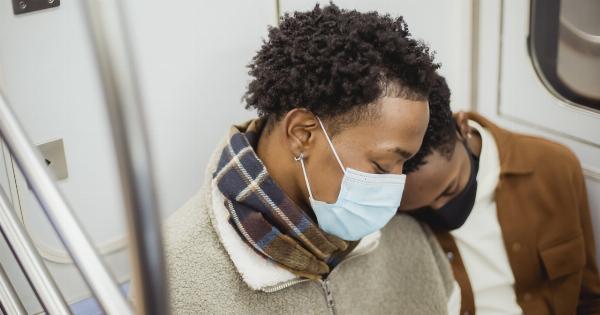Sleep apnea is a common sleep disorder characterized by pauses in breathing or instances of shallow or infrequent breathing during sleep.
These breathing interruptions can last for a few seconds to a few minutes and may occur multiple times throughout the night. Sleep apnea can have a significant impact on your overall health and well-being, leading to various complications if left untreated.
The Importance of Treating Sleep Apnea
Untreated sleep apnea can have serious consequences on your physical and mental health. Some of the potential complications associated with this sleep disorder include:.
- High blood pressure
- Heart disease
- Stroke
- Diabetes
- Depression
- Memory problems
By recognizing the symptoms of sleep apnea and seeking appropriate treatment, you can improve your overall health and prevent these complications.
Understanding Sleep Apnea Masks
A sleep apnea mask, also known as a continuous positive airway pressure (CPAP) mask, is a device commonly used in the treatment of sleep apnea.
It works by delivering a constant flow of air into your airway, ensuring that it remains open and alleviating the breathing difficulties caused by sleep apnea.
The Benefits of Using a Sleep Apnea Mask
Using a sleep apnea mask can have numerous benefits for individuals suffering from sleep apnea. Some of these advantages include:.
- Improved quality of sleep: By keeping your airway open throughout the night, the sleep apnea mask can help you achieve a more restful and uninterrupted sleep.
- Reduced daytime fatigue: Sleep apnea often leads to excessive daytime sleepiness and fatigue. However, using a sleep apnea mask can significantly reduce these symptoms, allowing you to feel more energized during the day.
- Lower risk of complications: By effectively treating sleep apnea, you can reduce the risk of developing health complications such as heart disease, stroke, and diabetes.
- Improved focus and concentration: Sleep apnea can impair cognitive function and negatively affect your ability to concentrate. By properly managing your sleep apnea with a mask, you can enhance your focus and cognitive performance.
Types of Sleep Apnea Masks
There are several types of sleep apnea masks available to cater to individual preferences and needs. These include:.
Nasal Masks
Nasal masks cover the entire nose and provide a secure fit. They are an excellent option if you breathe primarily through your nose.
Full Face Masks
Full face masks cover both your nose and mouth, ensuring effective ventilation even if you breathe through your mouth during sleep.
Nasal Pillow Masks
Nasal pillow masks are the smallest and most lightweight option. They seal around your nostrils and are ideal for individuals who feel claustrophobic wearing a larger mask.
Oral Masks
Oral masks, also known as mouth masks, fit over your mouth and can be an alternative for individuals with nasal obstructions.
Hybrid Masks
Hybrid masks combine features of both nasal masks and oral masks, providing a comprehensive solution for individuals with specific breathing patterns.
Choosing the Right Sleep Apnea Mask
When selecting a sleep apnea mask, it is crucial to consider your personal preferences and specific breathing patterns. Here are a few factors to keep in mind:.
Comfort
Choose a mask that feels comfortable on your face, as you will be wearing it for several hours every night. Look for masks with adjustable straps and cushioning for a personalized fit.
Seal
A good seal is essential to ensure effective delivery of pressurized air. Test the mask before purchasing to ensure it forms a secure seal and prevents leaks.
Breathing Habits
If you primarily breathe through your nose, nasal masks or nasal pillow masks may be the best option. If you tend to breathe through your mouth during sleep, consider full face masks or oral masks.
Cleaning and Maintenance
Choose a mask that is easy to disassemble and clean regularly. Proper maintenance is crucial to prevent the build-up of bacteria and ensure the longevity of the mask.
Compatibility with CPAP Machines
Ensure that the sleep apnea mask you choose is compatible with your CPAP machine to ensure proper functioning and effective treatment.
Tips for Effective Usage of Sleep Apnea Masks
Once you have selected the right sleep apnea mask, it is essential to use it correctly to maximize its effectiveness. Here are some tips for effective usage:.
Proper Fit
Adjust the straps of your mask to achieve a snug, but not overly tight, fit. This will help maintain the seal and minimize leaks.
Regular Cleaning
Clean your mask and its components on a regular basis to prevent the build-up of dirt, oil, and bacteria. Follow the manufacturer’s instructions for cleaning and maintenance.
Consistent Usage
Use your sleep apnea mask every night, even if you feel fine. Consistent usage ensures that you receive continuous and effective treatment for sleep apnea.
Positioning
Ensure that your mask is properly positioned on your face, covering your nose, mouth, or both, according to the type of mask you are using.
Avoid Substances that Interfere with Sleep
Avoid alcohol, sedatives, and other substances that can relax your throat muscles and contribute to the obstruction of your airway.
Conclusion
A sleep apnea mask can be a lifesaver for individuals suffering from sleep apnea. By ensuring the continuous flow of air, these masks help alleviate breathing difficulties during sleep and improve overall health and well-being.
With various mask options available, it is important to select one that suits your comfort, breathing habits, and personal preferences. Remember to use your sleep apnea mask consistently and maintain proper hygiene for optimal results.




























